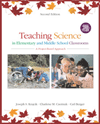| apply | To make use of something; in this case, make use of scientific understandings.
|
 |
 |
 |
| artifacts | Products that illustrate what one has learned.
|
 |
 |
 |
| collaborate | To work with another person or group on a science topic.
|
 |
 |
 |
| collaboration | The act of working with another person or group to accomplish something in a science classroom.
|
 |
 |
 |
| concepts | An idea or basic understanding.
|
 |
 |
 |
| construct meaning | Create understanding.
|
 |
 |
 |
| creativity | Use one's imagination to develop a new idea or product.
|
 |
 |
 |
| curiosity | Eagerness to learn or know something in science.
|
 |
 |
 |
| driving questions | Problems that serve to organize and guide instructional tasks and activities.
|
 |
 |
 |
| goals | A benchmark that one wants to achieve.
|
 |
 |
 |
| guide | A person who is leading students in the right direction.
|
 |
 |
 |
| hypotheses | Tentative explanations for scientific phenomenon.
|
 |
 |
 |
| inquiry | An investigation of a scientific nature.
|
 |
 |
 |
| integration | The combination of science with other subject areas.
|
 |
 |
 |
| interdisciplinary | Connected to other fields of study.
|
 |
 |
 |
| interest | A topic of curiosity or concern to learn more about.
|
 |
 |
 |
| investigations | Inquiry into a topic using scientific skills.
|
 |
 |
 |
| learning technologies | Technology tools that can support students in learning.
|
 |
 |
 |
| less content | Fewer topics to be studied, but studied more in-depth.
|
 |
 |
 |
| nature of science | The historical aspects of science and idea that science is an ongoing, changing process.
|
 |
 |
 |
| prior experiences | Experiences students learned in life before the current topic was introduced.
|
 |
 |
 |
| process | A series of actions or steps.
|
 |
 |
 |
| project-based science | A teaching approach that engages young learners in exploring important and meaningful questions through a process of investigation and collaboration. Throughout this dynamic process, students ask questions, make predictions, design investigations, collect and analyze data, make products, and share ideas. As a result, students learn fundamental science concepts and principles that they apply to their daily lives.
|
 |
 |
 |
| science | The study of the physical world.
|
 |
 |
 |
| scientific attitudes | Attitudes of openness, curiosity, skepticism, etc.
|
 |
 |
 |
| subquestions | Questions that come from another, more central question.
|
 |
 |
 |
| theories | A body of rules and principles that apply to science; a conjecture or belief about a topic in science.
|
 |
 |
 |
| think critically | Be able to judge and analyze a topic.
|



 2003 McGraw-Hill Higher Education
2003 McGraw-Hill Higher Education